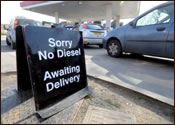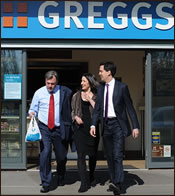A Plague of Hobgoblins
 What a difference a panic makes. Last Thursday, I decided I’d go shopping on my way home. As I approached the turn, I noticed that there was a queue of cars going the same way; they were coming in from every conceiveable direction. Reluctantly, I joined the stuttering, coughing procession and turned up Radio 3 to pass the time. After all, it was a bright afternoon and there were worse places to be than behind the wheel.
What a difference a panic makes. Last Thursday, I decided I’d go shopping on my way home. As I approached the turn, I noticed that there was a queue of cars going the same way; they were coming in from every conceiveable direction. Reluctantly, I joined the stuttering, coughing procession and turned up Radio 3 to pass the time. After all, it was a bright afternoon and there were worse places to be than behind the wheel.
Slowly, gingerly, I proceeded towards the gates of the car park. I saw that there was a young man dressed in a flourescent vest. He leaned in and interrogated each driver in turn; I had a fair idea what it was about. I wasn’t surprised when I arrived at the front that he asked, “Are you here for fuel or to do shopping?”
“To do shopping,” I replied. I was directed to enter via an exit; I drove in, parked and cast a glance at the petrol station forecourt. There were cars of every type: Ford Transit vans, small Japanese compacts, a highly polished Mercedes, a couple of careworn Peugeot estate cars. The drivers pumping fuel were as diverse as their motors: middle aged mums, grey haired executives, an Asian man in a skull cap, a teenage girl in sunglasses. Surrounding the forecourt was a messy lump of cars, unable to form into an orderly queue. More supermarket staff in flourescent vests ran from car to car, trying their best to direct and guide.
“You idiot,” I said. My comment was directed at Francis Maude. His ill advised statement about stocking up on fuel had led to this. People can’t afford to not get to work: unemployment here is above the national average. Jobs are precious; my local surgery recognises this and has late opening hours to accomodate. A young woman who waited on me at Akbar’s Cafe on Saturday couldn’t do enough for my girlfriend and myself; I assumed it was because she felt lucky to have a job and was clutching the opportunity as tightly as possible. People must get to work: to do that they must have fuel, and the petrol station was overrun.
I shook my head as I walked into the store. Had David Cameron acted quickly and prudently, this situation was entirely unnecessary. He could have sacked Maude and said without equivocation that there was no reason to panic. After all, no fuel truckers’ strike had actually been declared. What was more, the Fire Brigade was incensed by Maude’s remark about storing fuel in jerry cans; this had the sickeningly sad result of a woman in York suffering 40% burns this past Friday.
I did my shopping and then headed for home. The queue was as long as ever: if anything, it was getting bigger. I shook my head again. Cameron, Maude, Osborne, et al, they are all educated people, surely at some point they must have learned about the power of words and how they convey meaning even if it isn’t explicitly stated. Saying there was potential for a fuel crisis brought the possibility forward in the minds of many people: they could foresee the feeble excuses they’d have to make, their pay being docked, the ever increasing bills not being paid. Oh no, oh no, must get fuel, have to work, cannot be immobile.
48 hours later, the panic had dissipated. I went for a shave at my usual barber and went to fuel up at the same supermarket. En route, I noticed that Murco still was charging 10 pence over the odds for a litre of fuel, whether diesel or unleaded. I found the supermarket forecourt now to be nearly deserted: I didn’t have to wait. I got out, took in the cool early afternoon air, and fuelled up. The price had spiked up by 1p a litre since last time; my eyes still water when I think of the costs involved. But nevertheless, I was done quickly, and I drove off, ready for all the driving the week ahead would require.
Later, I perused the internet and found that the Conservative Party was telling itself that the fuel crisis was its Thatcher moment, comparable to the war waged against the National Union of Mineworkers in the 1980’s. My instant, sarcastic reaction was that it was difficult to see this comparison being valid unless the police were set to deal with queuing motorists with truncheons. More seriously, the idea that one would seek or exploit such a crisis to some political end, indeed to “humiliate” the union, while at the same time risking lives and livelihoods was disgusting. I couldn’t help but think of the sage words of H.L. Mencken:
“The whole aim of practical politics is to keep the populace alarmed (and hence clamorous to be led to safety) by menacing it with an endless series of hobgoblins, all of them imaginary.”
This government has decided to wreck the existing arrangements for the running of the National Health Service; in other words, they’re privatising it. The effect is already being felt: the Yorkshire Post weekend edition made clear that the local health authority is going to have to find £250 million in savings. It’s difficult to see how this will be achieved. I once went with my girlfriend to the Bradford Royal Infirmary: the waiting room was full to bursting with patients of all kinds, some writhing in pain. The average wait for these patients was 5 hours.
That scene is not the forefront of the government’s mind. One of its major priorities is cutting tax rates for the most well off. Furthermore, it has blessed Vodafone’s avoidance of paying its back taxes in full, yet simultaneously has decided to penalise the most poor and vulnerable by reducing their benefits.
 Cities like Bradford suffer from such despair that they are willing to turn to the likes of George Galloway, a human megaphone, in the hopes of being heard. Yet the media’s attention has mostly been transfixed by an entirely imaginary and avoidable fuel shortage. The Labour Party has abdicated from its responsbility as the opposition by focusing its attention on how Cornish pasties are going to be taxed more, provided they’re served above ambient temperature. The hobgoblins dance and weave and do pirouettes in front of the television cameras, while the giants of want, greed and neglect ravage the land. When a seismic event such as the Bradford West by-election happens, the leaders of both the Conservatives and Labour try to dismiss it as a one off: the current spin is that Galloway is a formidable campaigner whose ideas found a willing audience with both “young Muslims” and “Muslim women”. Of course, Bradford West is a diverse constituency and the Muslim vote alone can’t explain his 10,000 plus majority, but never mind. Look at the pasty tax, look to the fuel shortage: don’t look at genuine poverty and true grievance. Stick to existing arrangements and vote Labour if you’re in an industrial town or Conservative if in an affluent suburb: the present order must be preserved.
Cities like Bradford suffer from such despair that they are willing to turn to the likes of George Galloway, a human megaphone, in the hopes of being heard. Yet the media’s attention has mostly been transfixed by an entirely imaginary and avoidable fuel shortage. The Labour Party has abdicated from its responsbility as the opposition by focusing its attention on how Cornish pasties are going to be taxed more, provided they’re served above ambient temperature. The hobgoblins dance and weave and do pirouettes in front of the television cameras, while the giants of want, greed and neglect ravage the land. When a seismic event such as the Bradford West by-election happens, the leaders of both the Conservatives and Labour try to dismiss it as a one off: the current spin is that Galloway is a formidable campaigner whose ideas found a willing audience with both “young Muslims” and “Muslim women”. Of course, Bradford West is a diverse constituency and the Muslim vote alone can’t explain his 10,000 plus majority, but never mind. Look at the pasty tax, look to the fuel shortage: don’t look at genuine poverty and true grievance. Stick to existing arrangements and vote Labour if you’re in an industrial town or Conservative if in an affluent suburb: the present order must be preserved.
I would like to present the internet as a means by which the hobgoblins can be slain: however they just as frequently run amok. Yet, to borrow a phrase from the “X Files”, the truth is out there. The truth can be acccessed, cross referenced and verified. There is no fuel shortage. A pasty tax is irrelevant. Our National Health Service is worth saving. Bradford speaks for much of the nation. The Conservative Party represents a gilded elite and the Labour Party speaks increasingly for no one except themselves. And yes, we can do better.


